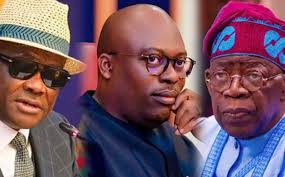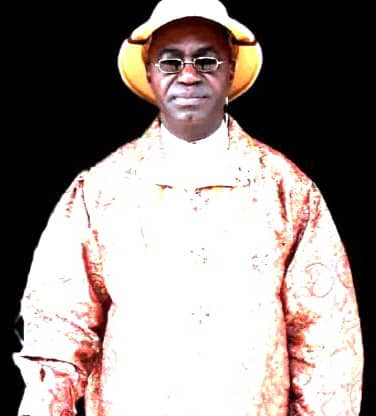Rivers
Fight Riverine, Upland Politics In Rivers, Don Urges Stakeholders

A renowned scholar of Environmental Literature, Ignatius Ajuru University of Education (IAUE), Port-Harcourt, Rivers State, Nigeria, Professor Anthony Adele Orlu, has called on Rivers State citizens to collectively fight the unhealthy politics of upland and riverine dichotomy.
Speaking while delivering the 63rd inaugural lecture of IAUE last Thursday at the university auditorium, main campus, titled, “Literature, Environmental, Violation and Leadership Crisis in the Niger Delta”, Professor Orlu stated that the element of disunity has dampened the economic fortunes of the region and further exacerbated the sense of deprivation in the citizens.
While advocating for the provision of a leadership that indulges all ethnic groups in the region, he stated that those from the upland also have water body and are not totaling isolated from rivers.
He also enlightened the audience that those from the riverine do not live inside the river but on land, adding that since there is also land everywhere in the region, the ploy or attempt to divide the people along these lines should be resisted at all cost.
The inaugural Lecturer emphasized that divisions based on ethnic lines of Ijaw, Ikwerre, Etche and so on should be discarded and inclusivity practiced.
The Rumuwoji Oroabali Rebisi-born Professor reiterated that militancy in all forms should be thrown into the garbage heap of history as these militants have become extremely rich and powerful to the detriment of the people.
He further stated that their contributions to economic or physical redemption of the region is not felt in anyway, especially as some of them have become self-acclaimed warlords, maintain their own non-state actors and have continually terrorized the region at will.
Corruption and ethnicity, he explained, are the major cankerworms that have destroyed the sense of unity to n the State.
He encouraged all to “resist the common enemy and to fight for the unity of Rivers State people”.
Professor Orlu proposed a new strand of the ecological theory to be known as ec-hygiene.
This eco-hygiene strand, which, he explained, examines issues concerning personal hygiene and its impact on the environment, has not been mentioned by other theorists.
He stated that issues bothering on public defecation, open urination along street corners and major highways, lack of cleanliness at home, office, car, kitchen, noise pollution in the church, on the street and so on, are the concerns of the eco-hygiene strand of the ecological theory.
He, therefore, advocated the inclusion of the eco-hygiene strand to the whole gamut of ecological literary analyses.
As far as the Professor of Environmental Literature is concerned, eco-hygiene as a strand of the ecological theory “will ensure that the searchlight of analyses will shift slightly away from the activities of Shell Petroleum Development Company and other oil prospecting companies to the examination of the activities of the individual in his personal environment”.
The 63rd Inaugural Lecturer also exposed the importance of environment to the study of literature, especially as the cherished environment of the Niger Delta region is facing extinction with the discovery of the “black gold”, which has led to the destruction of farmlands, caused environmental pollution and the violation of the biosphere through spillages, flooding, gas flaring with its inhuman effects on the entire flora and fauna.
Orlu reaffirmed that the importance of the lecture “is not only about the examination of the degree of environmental deprivation caused by the prospecting of crude petroleum, but also the activities of man and his sense of hygiene with regards to the preservation of the environment”.
He, therefore, hinted that it is on this understanding that the issue of environmental personal hygiene becomes the fulcrum of the lecture for which a new strand of the eco-theory , to be known as eco-hygiene is proposed.
In concluding, Professor Orlu highlighted the importance of the environment to the study of literature, particularly in the Niger Delta region, where the cherished environment is facing extinction due to oil prospecting activities.
Speaking at the event, the Dean, Faculty of Humanities, Professor Kingdom Eke Orji, who represented the Acting Vice Chancellor of IAUE, commended the Inaugural Lecturer and emphasized the need for citizens to stop apportioning blame to oil companies and focus on individual actions that constitute nuisance.
Professor Orji, who declared that “the fault is on ourselves and not in our stars”, urged all to not allow individual differences to prevent achievement of common goal, but to promote peaceful coexistence, unity and inclusivity, and to adopt eco-hygiene practices to mitigate environmental degradation.
The Registrar of IAUE, Dr. Chinonye Abraham Ajie, also commended Professor Orlu for his position on the subject matter and expressed the hope that all would abide by his proposed eco-hygiene.
In a vote of thanks, the former University Librarian, Orator, now the Head, Department of Library and Information Science, Professor Boma Beatrice Obi, lauded the 63rd Inaugural Lecturer for the epoch making lecture and enjoined all to “take responsibility for our collective actions as well as our impact on the environment”.
She appreciated everyone who turned out to support the Inaugural Lecturer and made the event a success.
By: Sogbeba Dokubo
Rivers
RSU Admits 11,083 Students For 2024/2025 Academic Session
The management of the Rivers State University, (RSU), Nkpolu Oroworukwu Port Harcourt has admitted eleven thousand and eighty-three students to study in various disciplines and courses for 2024/2025 academic sessions in the university.
The vice chancellor of the university,prof Isaac Zeb-Obipi disclosed this during his address at the 43rd matriculation ceremony of the institution held at the convocation arena in Port Harcourt, last Friday.
Zeb-obipi expressed delight that it was a privilege to welcome everyone to the momentous occasion, marking the beginning of an exciting academic journey for the new students and described matriculation as an important ceremony organised by institutions, especially universities.
“Though this is the 43rd matriculation ceremony of the university,it is the first under my watch as vice chancellor, and I am highly excited that I am having my tail cut in the conduct of this significant ritual of matriculation.”
“Once again, I give God all the glory and thank the State Governor, Sir Siminalayi Fubara, the 14th Governing council under the leadership of Her Excellency, Hon. Justice Mary Odili and the host of others who played one role or the other in my emergence as the vice chancellor. May I also use this opportunity to acknowledge my co-contenstants that made the selection a worthy competition, especially Prof Adolphus J. Toby and prof Nkalo H.Ukoima. There is no doubt that they all mean well for the university and as such i am studying the various vision statements they had submitted for possible inclusion in the efforts to implement what we have, “he stated.
He explained that his vision is to transform the university into a world class, innovative, inclusive institution, fostering a culture of excellence, creativity, and social responsibility through the re-engineering of the university’s academic, administrative, and community engagement frameworks to ensure that they are student centric, faculty driven, community oriented responsive to the need of the 21st century.
According to him the university aim to achieve the visions by enhancing academic programmes to meet global standards, strengthening research capacity and promoting innovation and improving infrastructure and facilities to support teaching, learning research, and fostering partnerships with industries, government, and other stakeholders to promote community engagement and entrepreneurship among others.
The VC while giving the statistics of the administration said a total of 29,107 candidates took the university as first choice in the 2024 JAMB Examination, 16,172 qualified the institution 190 cutoff mark, 15,348 registered for the post UTME, while 15,014 participated in university test and out of the number,11,083 was admitted.
The VC while congratulating the matriculants, urged them to shun any forms of social vices such as cultism, examination malpractices, sorting and indicent dressing, adding that the the school has zero tolerance on indiscipline and other anti social behaviours that are detrimental to societal growth.
Akujobi Amadi
Rivers
Fubara’s Kinsman Denounce The Suspension Of Democratically Elected Officials

The Vice Chairman of Opobo Council of Chiefs, Alabo Edwin Cockeye Brown has joined the chorus of voices calling for an immediate end to the suspension of democratically elected officials in Rivers State.
The Opobo chiefs Council’s vice chair who was speaking on the sidelines at an emergency stakeholders’ congress of the INC held at the Ijaw House in Yenagoa last Wednesday, emphasized the gravity of the suspension of a state governor, deputy and legislators, characterizing it as an unprecedented assault on the democratic process.
He argued that suspending an elected governor and the state legislature not only undermine the mandate given by the electorate but also poses a significant threat to the political stability of the state. Brown further declared the suspension as “an aberration and travesty of the constitution.”
His words, “Even though the Nigerian Constitution grants the President powers to declare a state of emergency under Section 305, it does not authorize the suspension of democratically elected officials, such as governors or members of the legislature. The proper procedure for removing a governor is outlined in Section 188 of the Constitution, which requires legislative processes rather than executive fiat”.
Brown went on, “The unconstitutional suspension of democratically elected government officials is a Slowly but surely dismantling of democratic structures. This will not help our fledgling democracy, but will destroy all the gains so far made in this democratic dispensation”.
“This is not just about Governor Fubara; it is about every citizen of Rivers State who participated in a democratic election,” he stated. He added, “Injustice in Rivers State is injustice all over Nigeria because we are all governed by one constitution.”
He expressed concern that such actions could set a dangerous precedent, eroding public trust in the electoral system and democratic institutions across Nigeria.
He further articulated the historical context of the Ijaw struggle for
representation, highlighting the community’s long-standing grievances
regarding political marginalization.
“For over 24 years, we have fought to regain our rightful place in governance,” Brown remarked. “To have that struggle undermined by a unilateral decision from the federal government is not just
frustrating—it is an affront to our identity and aspirations as Ijaw people.”
Brown called for a united front among Ijaw leaders and communities,
urging them to resist any attempts to divide or silence their voices.
He underscored the importance of dialogue and reconciliation as vital
pathways to resolving the ongoing crisis, rather than resorting to forceful measures that could exacerbate tensions. “We must engage with
the federal government, but we will do so on our terms,” he insisted.
In closing, Brown reaffirmed his commitment to the principles of
justice and equity, emphasizing that the Ijaw people would not back down in their quest for recognition and respect.
“We are prepared to stand firm and advocate for our rights. Our
history is rich with leaders who have fought for us, and we will not
allow their sacrifices to be in vain,” he concluded, rallying support
for a peaceful resolution that honors the democratic process and the will of the Rivers people.
The high-profile one-day stakeholders’ meeting brought together
influential Ijaw leaders, including Bayelsa State Governor, Douye
Diri, his deputy, Senator Lawrence Ewhrudjakpo; former Rivers State
Governor and Amanyanabo of Twon-Brass, King Alfred Diete-Spiff; former Rivers Governor, Chief Rufus Ada-George; and former Bayelsa Deputy
Governor, Rear Admiral Gboribiogha John Jonah.
Also in attendance were the Speaker of the Bayelsa State House of
Assembly, Abraham Ingobere; National Chairman of the Pan Niger Delta
Forum (PANDEF), Dr. Boladei Igali; prominent traditional rulers from
various parts of Ijawland; the President of the Ijaw Youth Council
(IYC), Jonathan Lokpobiri and many other notable Ijaw leaders from across the Niger Delta.

